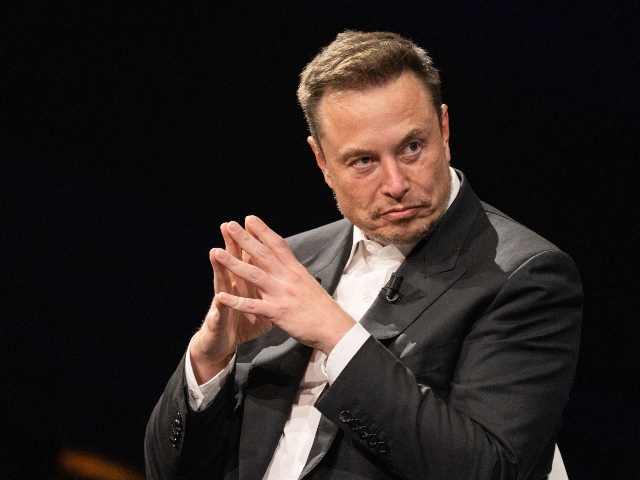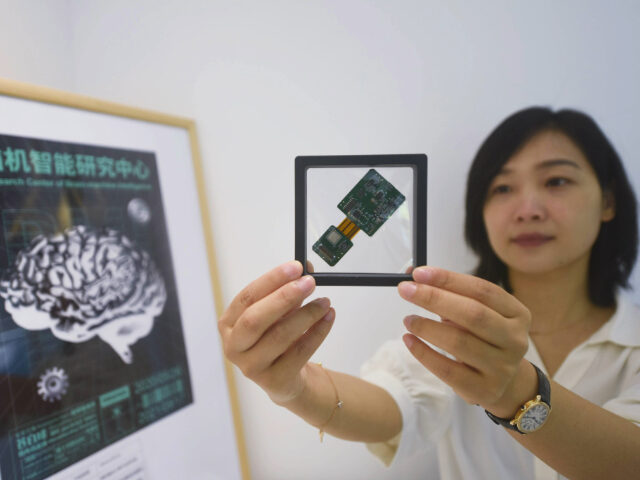The Chinese Ministry of Science and Technology released Friday “ethical guidelines” for brain-computer interfaces (BCI), seemingly in a hasty response to Tesla CEO Elon Musk announcing the first implantation of such a device into a human patient.
Musk announced in January that his company Neuralink had developed a BCI that implants thousands of electrodes in a human brain, giving doctors the ability to monitor and stimulate patients’ brain activity. Musk said the early results from the first implant were “promising.”
Musk said Neuralink’s technology was not only intended to serve as a brainwave monitoring and therapeutic device. He dubbed the new product “Telepathy” and said the ultimate goal was to allow humans to communicate with machines “just by thinking.”
The most urgent application of BCI technology would be giving superior prosthetic devices to people with severe physical disabilities. Neuralink is just beginning a six-year clinical trial to develop a device that could allow quadriplegics or people suffering from Lou Gehrig’s Disease to use their limbs by bypassing their damaged nervous systems.
“Initial users will be those who have lost the use of their limbs,” Musk said. “Imagine if Stephen Hawking could communicate faster than a speed typist or auctioneer. That is the goal.”

Elon Musk (Nathan Laine/Bloomberg)
China’s state-run Global Times on Monday cited Musk’s Neuralink prototype as the reason for the Ministry of Science and Technology convening a committee to draft “basic principles to be followed in conducting BCI research.”
The guidelines allow “clinical trials of innovative BCI products” to be conducted for “rare diseases that seriously endanger life and have no other effective treatment methods.”
On the other hand, “research that replaces or weakens human judgment and decision-making abilities, significantly interferes with or blurs human autonomy and self-awareness should be avoided,” at least until those technologies are “fully proven to be superior to human capabilities and have gained social consensus.”
Those parameters sound similar to other cases in which the Chinese Communist Party imposed seemingly strict regulations but included very generous escape clauses the government could invoke at will if officials feared China was falling behind the rest of the world. Avoiding elective BCI technology until it is “fully proven to be superior to human capabilities” and has achieved “social consensus” is an awfully vague and subjective standard.
The Chinese government guidelines distinguish between “invasive,” “restorative,” and “interventional” BCI research on humans, placing a generally lighter regulatory burden on non-invasive research that merely collects data on human brains but specifying much tighter rules on anything that involves neurosurgery, as Musk’s Neuralink Telepathy system does.
The regulatory package described by the Global Times casts a fairly wide net, as it includes regulations on a class of BCI devices that are “generally non-invasive” but “enhance users’ perception, cognition, and motor abilities of normal bodily functions.”
This is the type of BCI that will really fly off the shelves if Musk and his competitors at other technology firms are able to perfect safe and effective devices. Thinking caps are guaranteed to sell better than surgically implanted brain chips.
If non-invasive BCI tech meets existing standards in various nations for safety and effectiveness, it may become difficult to argue that it deserves an exceptionally heavy regulatory burden — and there is simply no way China would regulate itself into obsolescence while the rest of the planet raced ahead with thought-controlled weapon systems or implants that allow humans to think as fast as computers, for example.
The Global Times boasted that China is making BCI breakthroughs of its own and claimed its technology is even more promising than Neuralink:
Led by principal Biomedical Engineering researcher Hong Bo from the School of Medicine with Tsinghua University, the trial designed and developed the wireless minimally invasive implanted BCI technology device called NEO (Neural Electronic Opportunity). A NEO device was successfully implanted into a patient’s brain for the BCI-assisted treatment trial at Xuanwu Hospital in Beijing on October 24, 2023.
Team leader Hong told the Global Times in an earlier interview that compared with Neuralink’s technology, the NEO technology has the advantages of higher safety and long-term use.
In the conclusion of its article, the Global Times tipped that data security is one of China’s serious concerns for BCI technology, quoting researchers who said, “Handlers of important data should regularly conduct risk assessments of their data processing activities.”
“The outbound transfer of important data should also undergo a security assessment,” the Global Times added.
Chinese hackers will give the rest of the world plenty to worry about when it comes to BCI data security. The U.S. is currently fending off massive stealth attacks on critical infrastructure by Chinese state-sponsored hackers. Much mischief could be wrought by penetrating interfaces between the human mind and electronic computers and the mountains of sensitive data that such interfaces would produce.
Elon Musk said one reason Neuralink’s BCI product is called “Telepathy” is that humans might one day use such systems to communicate with each other mentally. Imagine what might happen if an advanced persistent threat group like China’s infamous Volt Typhoon hacked into that.

COMMENTS
Please let us know if you're having issues with commenting.